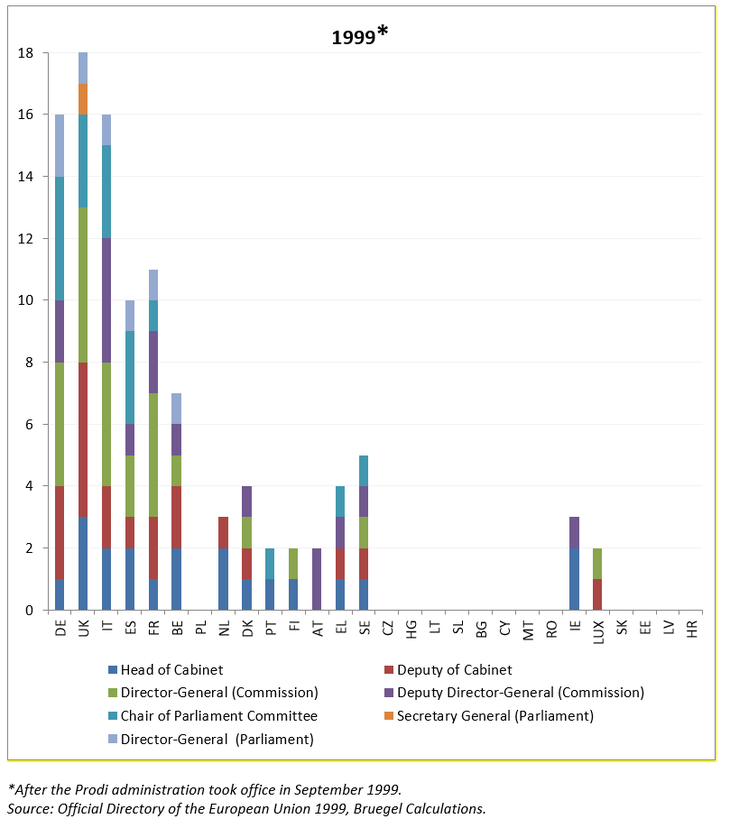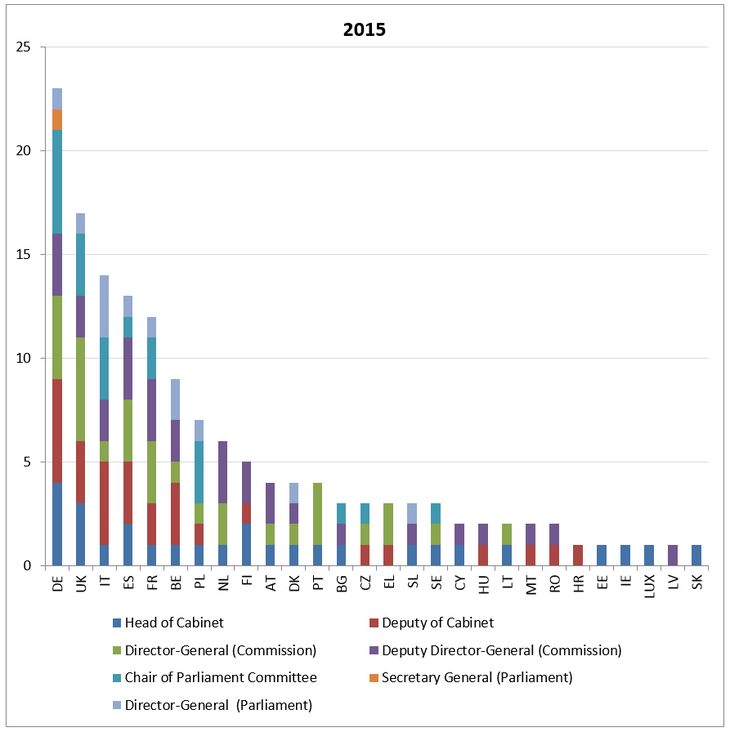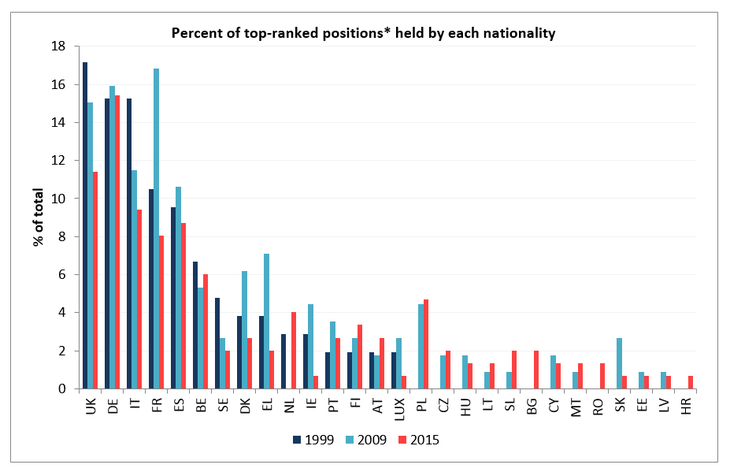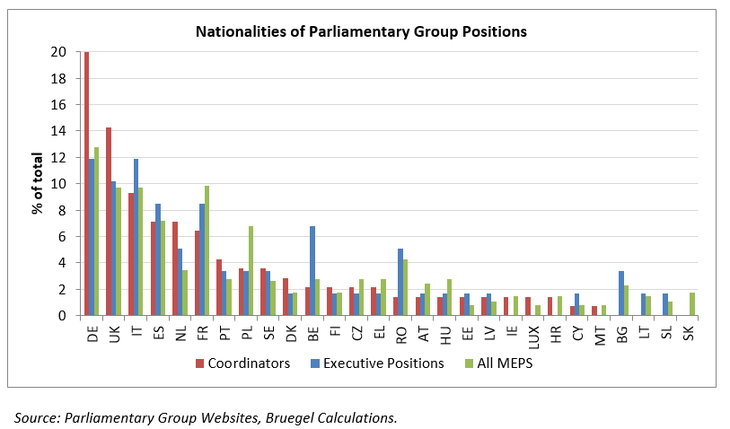Blog Post
Measuring Political Muscle in European Union Institutions
In this blog post we measure the number of top posts held by each nationality in the European Commission, the European Council and the European Parliament.
In this blog post we measure the number of top posts held by each nationality in the European Commission, the European Council and the European Parliament. We specifically count the Heads and Deputy Heads of the Cabinets of the Commissioners, the Director-Generals and Deputy Director-General of the Commission, the heads of the European Parliament Committees, the Director-Generals of the Parliament, the heads of the European Parliamentary Groups, and the Presidency of the European Council. For some groups, it is also possible to compare the change in relative numbers over time.
Top-level officials and parliamentarians represent the general European interest. Nevertheless, those in top positions are part of a tough bargaining structure among member states and are often seen as key people through whom the national political and administrative systems can have recourse. It is obvious that the number of positions is not necessarily equivalent to influence. Some top positions are more influential than others, certain portfolios may matter more for some countries than others, and even lower level position such as director can be more relevant to a specific portfolio etc. The number of top-level officials can also be the result of top people’s differing interests in becoming officials in Brussels and may reflect changing national dispositions towards careers in the EU capital. Still, the changing number of top positions probably gives a first indication of changing national influence.
In the European Union’s law making institutions today, Germany holds the greatest number of high ranked positions as compared to the other nations
In the European Union’s law making institutions today, Germany holds the greatest number of high ranked positions as compared to the other nations. In the European Commission, German nationals account for 16% of Head of Cabinet and Deputy Head of Cabinet positions and 11.6% of Directorate-General and Deputy Director-General positions. In the Parliament, 18% of Committee Chairs are German, as are 20% of the committee coordinators chosen by the parliamentary groups. Germany’s dominance in terms of the number of top-ranked political positions held in the EU, however, has not always been the norm. In contrast, France, which at the beginning of 2009 was the clear leader in Brussels-based institutions, has severely lost in terms of the number of top positions in Brussels and now holds fewer positions than Spain, a country that is significantly less populous.
The three charts below show how the number of top positions held by each nationality in the Cabinets of the Commissioners, the Directorate-Generals of the European Commission, the European Parliament Committees, and the Directorate-Generals of the Parliament, has evolved between 1999, 2009, and today. The numbers from 2009 (prior to the parliamentary elections in June) are interesting to consider since they reflect the make-up of the EU institutions just before the onset of the sovereign debt crisis.
Number of Commissioners’ Cabinet, Parliament Committee, and DG positions held by each nationality



Source: Official Directory of the European Union 2015, Bruegel Calculations.
In contrast with 1999, Germany now holds a greater number of these top-ranked commission and parliamentary positions (16 vs. 23), as does Spain (10 vs. 13) and France (11 vs. 12). The number of Italian nationals and UK nationals in these top positions, meanwhile, has dropped slightly from 16 to 14 and from 18 to 17 respectively. In 2009, however, it was France who led the pack with 19 of the top-ranked stations, a number that has now dropped significantly.
One also needs to consider that with the successive EU enlargements of 2004, 2007 and 2013, which were accompanied by an expansion of the commission, the numbers above may not accurately reflect the relative political influence of each country. We therefore include the chart below, which shows the aggregated commissioners’ cabinet positions, parliament committee chairs, and DG appointments held between 1999, 2009 and today, by each nationality as a percent of the total number of positions considered.

* Includes Heads of Cabinets, Deputies of Cabinets, Director-Generals (Commission), Deputy Director-Generals (Commission), Chairs of Parliament Committees, the Secretary General (Parliament), and Director-Generals (Parliament). Excludes European Council positions.
Source: Official Directory of the European Union (2015, 2005 and 1999), Bruegel Calculations.
the UK, Italy, and Spain have all seen relative declines in their commission and parliamentary appointments since 1999
As the chart makes clear, the UK, Italy, and Spain have all seen relative declines in their commission and parliamentary appointments since 1999, which is to be expected considering the inclusion of new member states in the Union. Germany, meanwhile, has seen almost no change in percentage of appointments, while France saw a substantial increase from 1999 to 2009 and a substantial decline since then.
While the data are not comparable across time, it is also worth noting the nationalities of the chief cabinet members of the President of the European Council, as well as the nationalities of the top-ranking Members of the European Parliament (MEPs) in the parliamentary groups. When Herman Van Rompuy assumed responsibility as the first full-time president of the council in 2010, he chose two fellow Belgians as his Head of Cabinet and Deputy Head of Cabinet. Meanwhile, current President of the European Council, Donald Tusk, has appointed a fellow Polish national as his Head of Cabinet and a Luxembourg national as Deputy Head of Cabinet. In this post I do not analyze the ECB, which of course is led by Italian national Mario Draghi as President.
Within the parliamentary groups, there are two different statistics to consider. The first is the nationalities of those in executive positions, that is, the chairs and vice-chairs, or the presidents and vice-presidents of the seven political groups that comprise the European Parliament. The second is the coordinators, which generally determine a group’s position and voting orientation on the policies that the 20 parliamentary committees consider. These figures are summarized in the chart below.

Whereas the nationalities among executive positions are relatively balanced with the five largest EU countries each holding between 12% and 8.5% of bureau positions, in terms of coordinator positions Germany holds 20% while the UK, Italy, Spain and France hold 14%, 9%, 7% and 6.5% respectively. Furthermore, when one considers that Germany and France hold a similar percentage of total MEP seats at 13% and 10% respectively, their relative position in terms of coordinators becomes even more striking.
Overall, the main findings can be summarized as follows:
· Germany holds the most top-ranked cabinet, DG, and parliamentary chair positions with 15.4% of appointments, as well as the most coordinator (20%) and executive positions (12%) in the parliamentary groups.
· The UK held the highest percentage (17%) of top cabinet, DG and parliamentary chair positions in 1999 and now trails behind Germany with 11.4% of positions. The UK also has the second highest percentage of coordinator and executive positions in the parliamentary groups at 14%, while accounting for only 9.7% of MEPs.
· Italy, which tied Germany for the second highest percentage of top cabinet, DG and parliamentary chair positions in 1999, now holds only 9.4% of these positions. Italy accounts for the third highest percentage of coordinators and ties Germany in terms of executive positions while accounting for 9.7% of MEPs
· The number of top cabinet, DG, and parliamentary chair positions held by Spaniards has increased since 1999 but has decreased as a percent of total positions from 9.5% to 8.7%.
· France held the highest percentage (16.8%) of top cabinet, DG and parliamentary chair positions in 2009 but has now dropped below Spain to the 5th highest spot with 8% of positions. France also holds only 8.5% of executive positions and 6.4% of coordinator positions while accounting for 10% of MEPs.
France’s drop in share of powerful appointments over the past few years has been substantial, and they indeed now trail behind Spain
Do these numbers then, support often-heard complaints that Germany is becoming a hegemonic power in Europe? Or Jean Quatremer’s article in Libération a few weeks ago lamenting France’s fall from power? In terms of number and percentage of influential political positions held by each nationality (at least for the ones considered here), Germany is certainly the frontrunner. Furthermore, the data from 2009 suggests that France’s drop in share of powerful appointments over the past few years has been substantial, and they indeed now trail behind Spain. France of course, is not alone in seeing its share of these influential positions decline, which is to be expected as more member states have joined the Union, requiring a rebalancing of power. However, if numbers and shares of position are a sign of national influence, then Germany has experienced a relative power gain.
Republishing and referencing
Bruegel considers itself a public good and takes no institutional standpoint. Anyone is free to republish and/or quote this post without prior consent. Please provide a full reference, clearly stating Bruegel and the relevant author as the source, and include a prominent hyperlink to the original post.







